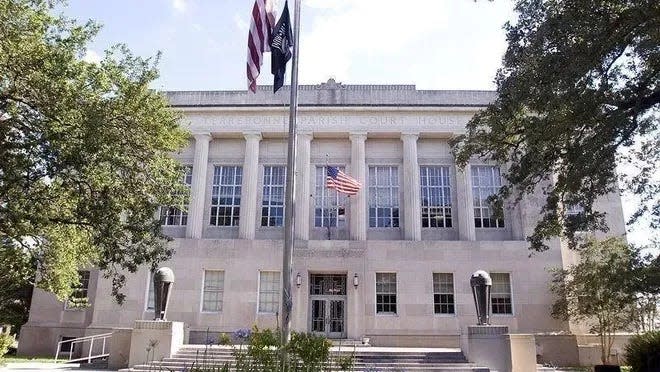Jury convicts Houma man for murder in killing crack cocaine cook over $1,400 worth of drugs
A Houma man was found guilty of murdering a local crack cocaine cook after he ruined a batch worth $1,400.
Jamar Mosley, 36, was found guilty of second-degree murder and possession of a firearm by a convicted felon. A 12-person jury returned the unanimous verdict after deliberating for one hour.
Opening statements began March 13, and closing arguments were delivered Monday in Judge Juan Picket's Division C courtroom. Sentencing is set June 20. Second-degree murder carries a life sentence.
During closing arguments, Prosecutor Chris Erny used a dry-erase board to write down 13 bullet points, repeatedly rewriting the date July 2, 2020, the date witnesses testified they last saw Mosley alive.
He played a video recording of Mosley being interviewed by police. In the interview, Mosely said Henry Allridge, the victim, cooked crack cocaine for him and was using a large pot to stretch the product. Detectives asked Mosely if the drugs were messed up. Mosley said nothing was wrong with the drugs, but he threw them away, and took a small pot for cooking before leaving.
"You don't throw dope away ‒ $1,400 of it," Erny said. "If Henry had already cooked dope for him, why did he need the pot?"

The evidence against Mosley for the murder charge was circumstantial. Tora Melendez was sleeping at Mosley's residence with her boyfriend, Shawn Thomas, the last day Allridge was seen alive, July 2, 2020.
"Thirty minutes go by, and I hear Jamar getting mad, saying Henry had messed up the cocaine," Melendez said.
She said she heard the two men arguing in another room, and that when she left the home, she saw Mosely with a gun. Shortly after she left she saw Mosely, Allridge and Thomas get in a vehicle together. Allridge never returned.
A missing person case began for Allridge, and his skeletal remains were found Nov. 7, 2020.
Dr. Ginesse A. Listi, a forensic anthropologist with the Louisiana State University FACES Lab, was part of the team that recovered Allridge's remains. The remains had been run over by a tractor, which shattered pieces of the skeleton. She and other members of the lab reconstructed what they found and were able to distinguish between the blades of the tractor and the beveling of a gunshot entrance wound to Allridge's skull.
"It's right here," Listi said, lifting her right hand and making a cupping motion on her own head. "The way the bone breaks, it will cause beveling to occur opposite of the impact."
Beveling is high velocity or gunshot trauma. There weren't enough skull fragments to locate where the exit wound was, but Listi showed how the bullet's damage to the bone was different than that of the tractor.
The murder weapon, caliber of the bullet, time of the murder and location of the murder were not established. Defense attorney Teresa King said the prosecution hadn't brought enough evidence, and that their entire case hinged on a witness who couldn't be trusted.
Melendez had told police conflicting stories throughout the investigation. She pled guilty to accessory after the fact for misleading the police after telling them she saw Thomas and Mosely bury Allridge's body in the woods of Dularge. Allridge's remains were found at 5442 N. Bayou Black Dr. Thomas is scheduled for trial at 9 a.m. March 25.
More: Lafourche Parish District 3 Fire Department proposes tax to generate more revenue
More: Jury convicts Montegut man of attempted rape, sexual battery in 2018 case
King used a measuring cup and a bottle of Coffee Mate Zero creamer as a visual display as she spoke. She pointed to the top line, saying that it was reasonable doubt.
"The testimony of Tora Melendez… threats allegedly made by Mosely to the family… the passage of time," she said. With each point she made, King poured more creamer into the cup, stopping short of the top line. King said Erny's case relied on Melendez's account for motive, and Melendez's numerous accounts meant her testimony couldn't be trusted.
"Without that statement, what other evidence do you have?," King said.
This article originally appeared on The Courier: Houma man convicted of second-degree murder in killing over crack cocaine

